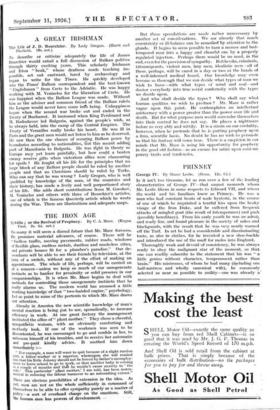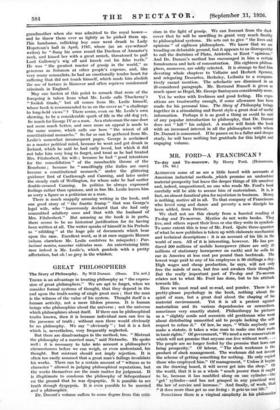PRINNEY
George IV. By Shane Leslie. (Been. 12s. GI) IF it isn't too tiresome, let us run over a few of the leading characteristics of George IV—that august monarch whom Mr. Leslie likens in some respects to Edward VII, and whom the world and his familiars knew as Prinney. He was a man who had constant bouts of male hysteria, in the course of one of which he imprinted a tearful kiss upon the beaky visage of the Iron Duke, and he suffered from frequent attacks of mingled gout (the result of intemperance) and gush (possibly hereditary). From his early youth he was an adroit and ready liar; and found pleasure in the society of rakes and blackguards, with the 'result that he was very nearly warned off the Turf. In art he had a considerable and discriminating taste, as also in clothes, for he invented a new shoe-buckle and introduced the use of the muff for males into England.
Thoroughly weak and devoid of consistency, he was always ready to obey the malignant star of the moment, so that one can readily subscribe to the statement that his was " a' little genius without character, temperament rather than brain." His mistresses, of whom he had many (including one half-mistress and wholly canonical wife), he commonly selected as near as possible to andity—one was already a' grandmother when she was admitted to the royal bower— and he threw them over as lightly as he picked them up. this handsome, rollicking boy once went drunk to Lady Hopetoun's ball in April, 1787, where (as an eye-witness writes) he " flung his arms round the Duchess of Ancaster's neck, and kissed her with a great smack, threatened to pull Lord Galloway's wig off and knock out his false teeth.' He was " the greatest master of gossip in the world," as generous as Solomon at other people's expense, and, like very many sensualists, he had an emotionally tender heart for suffering that did not touch himself, which made him abolish the use of torture in Hanover and often reprieve condemned criminals in England.
May one hasten at this point to remark that none of the foregoing is taken from what Mr. Leslie calls Thackeray's " foolish tirade," but all comes from Mr. Leslie himself, whose book is recommended to us on the cover as " a challenge to long-held views" ? There seems, even on Mr. Leslie's own showing, to be a considerable spark of life in the old dog yet. So much for George IV as a man. As a statesman the case does not seem much better, and once more an appeal is made to the same source, which calls our hero " the wisest of all constitutional monarchs." So far as can be gathered from Mr. Leslie's somewhat inconsequent pages, George is acclaimed as a master political mind, because he went and got drunk in Ireland, which he said he had early loved, but which it did not take him very long to forget, and treat as he had treated Mrs. Fitzherbert, his wife ; because he had " good intentions for the consolidation " of the ramshackle throne of the Bourbons ; because he " unwillingly (the italics are ours) became a constitutional monarch," under the glittering guidance first of Castlereagh and Canning, and later under the steady curb of Wellington, for whose sake he had earlier double-crossed Canning. In politics he always expressed feelings rather than opinions, and in fine Mr. Leslie leaves him as sorry a figure as a politician as a man.
There is much snappily amusing writing in the book, and one good story of " the frantic frump " that was George's legal wife, who " humorously declared that she had only committed adultery once and that with the husband of Mrs. Fit.zherbert." But amusing as the book is in parts, there seems to be no historical justification for its having been written at all. The writer speaks of himself in his Prelude as " nibbling " at the huge pile of documents which bear upon the case. Excellent word, as it at once suggests Horace (whom elsewhere Mr. Leslie contrives to misquote) : Par- turiunt monies, nascetur ridiculus mus. An entertaining little mus indeed is Mr. Leslie's, which gambols with a pretty affectation, but oh I so grey in the whisker.







































 Previous page
Previous page